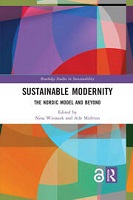Sustainable Modernity
Proposal review
The Nordic Model and Beyond
| dc.contributor.editor | Witoszek, Nina | |
| dc.contributor.editor | Midttun, Atle | |
| dc.date.accessioned | 2019-11-21 15:58:54 | |
| dc.date.accessioned | 2020-04-01T09:44:23Z | |
| dc.date.available | 2020-04-01T09:44:23Z | |
| dc.date.issued | 2018 | |
| dc.identifier | 1006010 | |
| dc.identifier | OCN: 1135845393 | en_US |
| dc.identifier.uri | http://library.oapen.org/handle/20.500.12657/24121 | |
| dc.description.abstract | The Open Access version of this book, available at https://www.taylorfrancis.com/books/e/9781351765633, has been made available under a Creative Commons Attribution-Non Commercial-No Derivatives 4.0 license. In the 21st century, Norway, Denmark and Sweden remain the icons of fair societies, with high economic productivity and quality of life. But they are also an enigma in a cultural-evolutionary sense: though by no means following the same socio-economic formula, they are all cases of a "non-hubristic", socially sustainable modernity that puzzles outside observers. Using Nordic welfare states as its laboratory, Sustainable Modernity combines evolutionary and socio-cultural perspectives to illuminate the mainsprings of what the authors call the "well-being society". The main contention is that the Nordic uniqueness is not merely the outcome of one particular set of historical institutional or political arrangements, or sheer historical luck; rather, the high welfare creation inherent in the Nordic model has been predicated on a long and durable tradition of social cooperation, which has interacted with global competitive forces. Hence the socially sustainable Nordic modernity should be approached as an integrated and tightly orchestrated ecosystem based on a complex interplay of cooperative and competitive strategies within and across several domains: normative-cultural, socio-political and redistributive. The key question is: Can the Nordic countries uphold the balance of competition and cooperation and reproduce their resilience in the age of globalization, cultural collisions, the digital economy, the fragmentation of the work/life division, and often intrusive EU regulation? With contributors providing insights from the humanities, the social sciences and evolutionary science, this book will be of great interest to students and scholars of political science, sociology, history, institutiona | |
| dc.language | English | |
| dc.relation.ispartofseries | Routledge Studies in Sustainability | |
| dc.subject.classification | thema EDItEUR::J Society and Social Sciences::JK Social services and welfare, criminology::JKS Social welfare and social services | en_US |
| dc.subject.classification | thema EDItEUR::K Economics, Finance, Business and Management::KC Economics::KCM Development economics and emerging economies | en_US |
| dc.subject.other | sustainable futures | |
| dc.subject.other | Nordic welfare | |
| dc.subject.other | welfare state | |
| dc.subject.other | Norway | |
| dc.subject.other | Denmark | |
| dc.subject.other | Sweden | |
| dc.subject.other | Qualtiy of life | |
| dc.subject.other | sustainable communities | |
| dc.subject.other | resilient communities | |
| dc.subject.other | Atle Midttun | |
| dc.subject.other | David Sloan Wilson | |
| dc.subject.other | Dag O. Hessen | |
| dc.subject.other | Øystein Sørensen | |
| dc.subject.other | Kirsti Klette | |
| dc.subject.other | Lars Trägårdh | |
| dc.subject.other | Cathrine Holst | |
| dc.subject.other | Kelly McKowen | |
| dc.subject.other | Nik Brandal | |
| dc.subject.other | Dag Einar Thorsen | |
| dc.subject.other | Lennart Olsson | |
| dc.subject.other | Jerome Lieberman | |
| dc.subject.other | Pamela Izvanariu | |
| dc.title | Sustainable Modernity | |
| dc.title.alternative | The Nordic Model and Beyond | |
| dc.type | book | |
| oapen.identifier.doi | 10.4324/9781315195964 | |
| oapen.relation.isPublishedBy | 7b3c7b10-5b1e-40b3-860e-c6dd5197f0bb | |
| oapen.relation.isbn | 9781138718210;9781351765633;9781351765619 | |
| oapen.identifier.ocn | 1135845393 | |
| peerreview.anonymity | Single-anonymised | |
| peerreview.id | bc80075c-96cc-4740-a9f3-a234bc2598f1 | |
| peerreview.open.review | No | |
| peerreview.publish.responsibility | Publisher | |
| peerreview.review.stage | Pre-publication | |
| peerreview.review.type | Proposal | |
| peerreview.reviewer.type | Internal editor | |
| peerreview.reviewer.type | External peer reviewer | |
| peerreview.title | Proposal review | |
| oapen.review.comments | Taylor & Francis open access titles are reviewed as a minimum at proposal stage by at least two external peer reviewers and an internal editor (additional reviews may be sought and additional content reviewed as required). |

